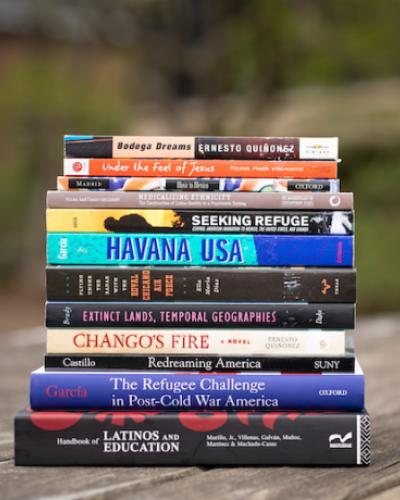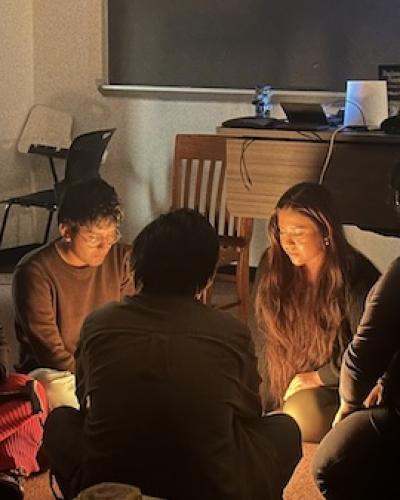Joshua Garcia (he/him/his) is an exemplary Ph.D. candidate in the School of Integrative Plant Science, Horticulture Section, currently conducting research for his dissertation and navigating what it means to be a Latinx, first generation student at Cornell. Originally from Surprise, Arizona, Josh earned his bachelor’s degree in Biological Sciences with a minor in Chicanx Studies at the University of California, Davis. His experiences working in the agroecology lab as an undergraduate shaped his interests and led him to pursue graduate studies in plant science.
Academically, Josh is working on his dissertation, “which looks at the ways soil microbiomes alter crop plant traits,” and he hopes it’ll be finished by next spring. More specifically, his research examines “plant growth promoting microbiomes and how they can confer desirable plant traits such as improved nutrient use efficiency in crops.” When asked about something he has discovered through his research, Josh shared that “In one of my projects, we were successful in selecting microbiomes in the plant root that altered nutrient use efficiency in Brassica rapa [related to broccoli] which was really exciting!”
Not only is Josh a student, but he is also an educator, and he has designed his own class, PLSCI1107: Writing in the Life Sciences, where students learn about scientific writing from a rhetoric perspective. Outside academics, Josh serves as an E-Board member for the Latinx Graduate Student Coalition (LGSC) and the Society for Horticulture Graduate Students. Josh also serves on the School of Integrative Plant Science’s Diversity & Inclusion committee and is a Graduate Teaching Fellow with the Center for Teaching Innovation. When he has time to relax, Josh loves reading, exercising, hiking and trying new recipes.
Josh’s accomplishments are the results of hard work and dedication, but also of resilience in navigating what it means to be Latinx and first generation at Cornell. Josh shares that it has been difficult asking for help and setting boundaries, and that cultural barriers have made it difficult to feel comfortable in specific academic spaces, such as research conferences. However, Josh states that “In the end though, where I came from is what keeps me going and I find strength in it.”
An added challenge this academic year is the COVID-19 pandemic, which has disproportionately affected marginalized students. For Josh, the pandemic has forced him to work from home, which, for one, has been isolating, and two, has made it difficult to focus. Josh shares that something that helped him was “asking for help from others and being patient and reasonable with myself.”
Despite the challenges, Josh is looking forward to teaching, connecting with others, and working on his dissertation this semester. Josh’s commitment to creating academic spaces for marginalized students is evident in his response when asked what he would like to change in his field and academia more generally: “For one, I hope to change how it is we teach and run biology and agriculture college classes. From my experiences, I’ve learned that they’re biased against students from marginalized groups and are set up to weed us out. I hope to contribute to efforts to change this through my teaching. I also hope to help change how we talk about DEI at the university level. Right now, a lot of the conversation is “how do we get more people from underrepresented groups to attend our school/program” when it should be “what do we need to change to better serve everyone and make these spaces more inclusive and equitable.” I also hope to help shift the focus in agriculture from simply producing more food to making our food systems more sustainable and, again, making changes to better serve people.”
Josh graduates next spring and his future plans include job-searching, but eventually he plans on becoming a professor working to build inclusive and equitable academic spaces.




